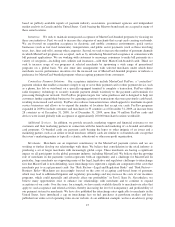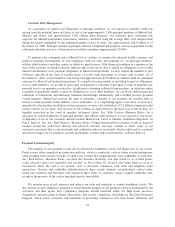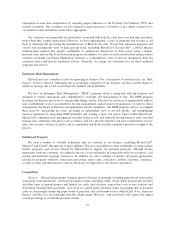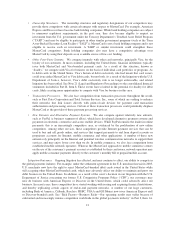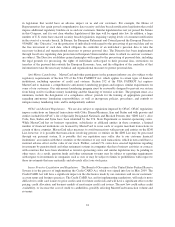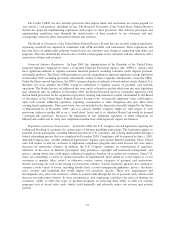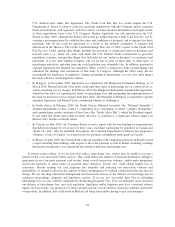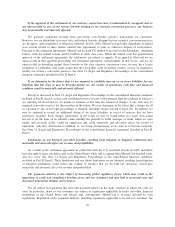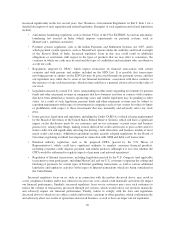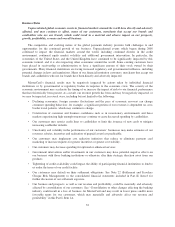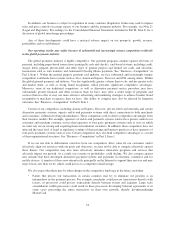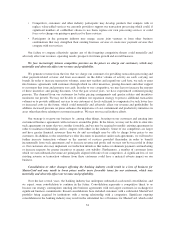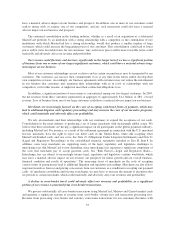MasterCard 2009 Annual Report Download - page 35
Download and view the complete annual report
Please find page 35 of the 2009 MasterCard annual report below. You can navigate through the pages in the report by either clicking on the pages listed below, or by using the keyword search tool below to find specific information within the annual report.The Credit CARD Act also includes provisions that impose limits and restrictions on certain prepaid (or
“pay before”) card products, including on fees. The Board of Governors of the United States Federal Reserve
System has proposed implementing regulations with respect to these provisions. The statutory provisions and
implementing regulations may diminish the attractiveness of these products to our customers and may
consequently adversely affect transaction volumes and revenues.
The Board of Governors of the United States Federal Reserve System has also recently adopted regulations
regulating overdraft fees imposed in connection with ATM and debit card transactions. These regulations will
have the effect of significantly reducing overdraft fees our customers may charge in connection with debit card
programs. This may diminish the attractiveness of debit card programs to our customers and may adversely affect
transaction volumes and revenues.
Financial Industry Regulation. In June 2009, the administration of the President of the United States
proposed legislative language to create a Consumer Financial Protection Agency (the “CFPA”), which could
have significant authority to regulate consumer financial products, including consumer credit, deposit, payment,
and similar products. The House of Representatives passed comprehensive financial regulatory reform legislation
in December 2009, including provisions substantially similar to those originally introduced to create the CFPA.
Under the House-passed legislation, the CFPA’s proposed grant of authority is broad and not clearly defined. It is
therefore not clear whether the CFPA would be authorized to regulate aspects of payment card network
operations. The Senate has not yet addressed this issue and it is therefore unclear what form any such legislation
may ultimately take. In addition, in December 2009, the House Financial Services Committee approved a bill
that included provisions for the regulation of payment, clearing and settlement systems (determined by the Board
of Governors of the United States Federal Reserve System to be “systemically important”) that could impose
upon such systems additional regulatory, reporting, examination or other obligations that may differ from
existing legal requirements. These provisions were not included in the financial reform bill adopted by the House
of Representatives in December 2009, and it is unclear whether Congress might act with respect to such
provisions (either in another bill or on a “stand alone” basis) and, if so, whether MasterCard would be deemed
“systematically important”. However, the imposition of any additional regulatory or other obligations on
MasterCard could result in costly new compliance burdens that could negatively impact our business.
Regulation of Internet Transactions. In October 2006, the U.S. Congress enacted legislation requiring the
coding and blocking of payments for certain types of Internet gambling transactions. The legislation applies to
payment system participants, including MasterCard and our U.S. customers, and is being implemented through a
federal rulemaking process that was completed in December 2008. Compliance will be required by June 1, 2010,
although Congress may consider additional legislation to legalize and regulate Internet gambling. These federal
rules will require us and our customers to implement compliance programs that could increase our costs and/or
decrease our transaction volumes. In addition, the U.S. Congress continues its consideration of regulatory
initiatives in the areas of Internet prescription drug purchases, copyright and trademark infringement, and
privacy, among others, that could impose additional compliance burdens on us and/or our customers. Some U.S.
states are considering a variety of similar legislation. If implemented, these initiatives could require us or our
customers to monitor, filter, restrict, or otherwise oversee various categories of payment card transactions,
thereby increasing our costs or decreasing our transaction volumes. Various regulatory agencies also continue to
examine a wide variety of issues, including identity theft, account management guidelines, privacy, disclosure
rules, security and marketing that would impact our customers directly. These new requirements and
developments may affect our customers’ ability to extend credit through the use of payment cards, which could
decrease our transaction volumes. In some circumstances, new regulations could have the effect of limiting our
customers’ ability to offer new types of payment programs or restricting their ability to offer our existing
programs such as stored value cards, which could materially and adversely reduce our revenue and revenue
growth.
25


